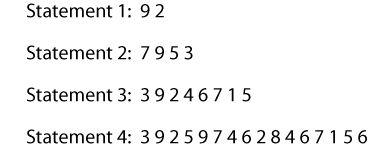Cognitive Load Theory
What is cognitive load?
Cognitive load refers to the total amount of mental activity needed to be done by working memory at an instance in time.
The major factor that contributes to cognitive load is the number of elements that need to be attended to.
Look at each of the following statements in turn for just a few seconds, and try to memorise the sequence of digits. Note that you do not need to remember all of the statements at once. Give all of your attention to each statement in turn.

For this activity we may use the number of digits (the elements) to be remembered as a simple measure of cognitive load. Consequently:

Note that the measure used for cognitive load does not equate mathematically to task difficulty. That is, even though statement 2 has twice the number of digits as statement 1, each is easy to remember.
In contrast, statement 4 has twice the number of digits as statement 3, yet seems more than twice as difficult to remember. When 8 elements are presented it places us at the upper bounds of our working memory capacity and on the “cusp” of cognitive management. When a set of 16 elements is presented our capacity is far exceeded and processing fails.
The next pages give information about each of the following as they relate to cognitive load theory:
- Element interactivity: reasons why some material is difficult to learn
- Memory elements : the relationship between working memory and schemas
- Intrinsic, extraneous and germane cognitive load: the different types of cognitive load
- Cognitive load principles: a summary of the principles of cognitive load theory.
Next: Element Interactivity
